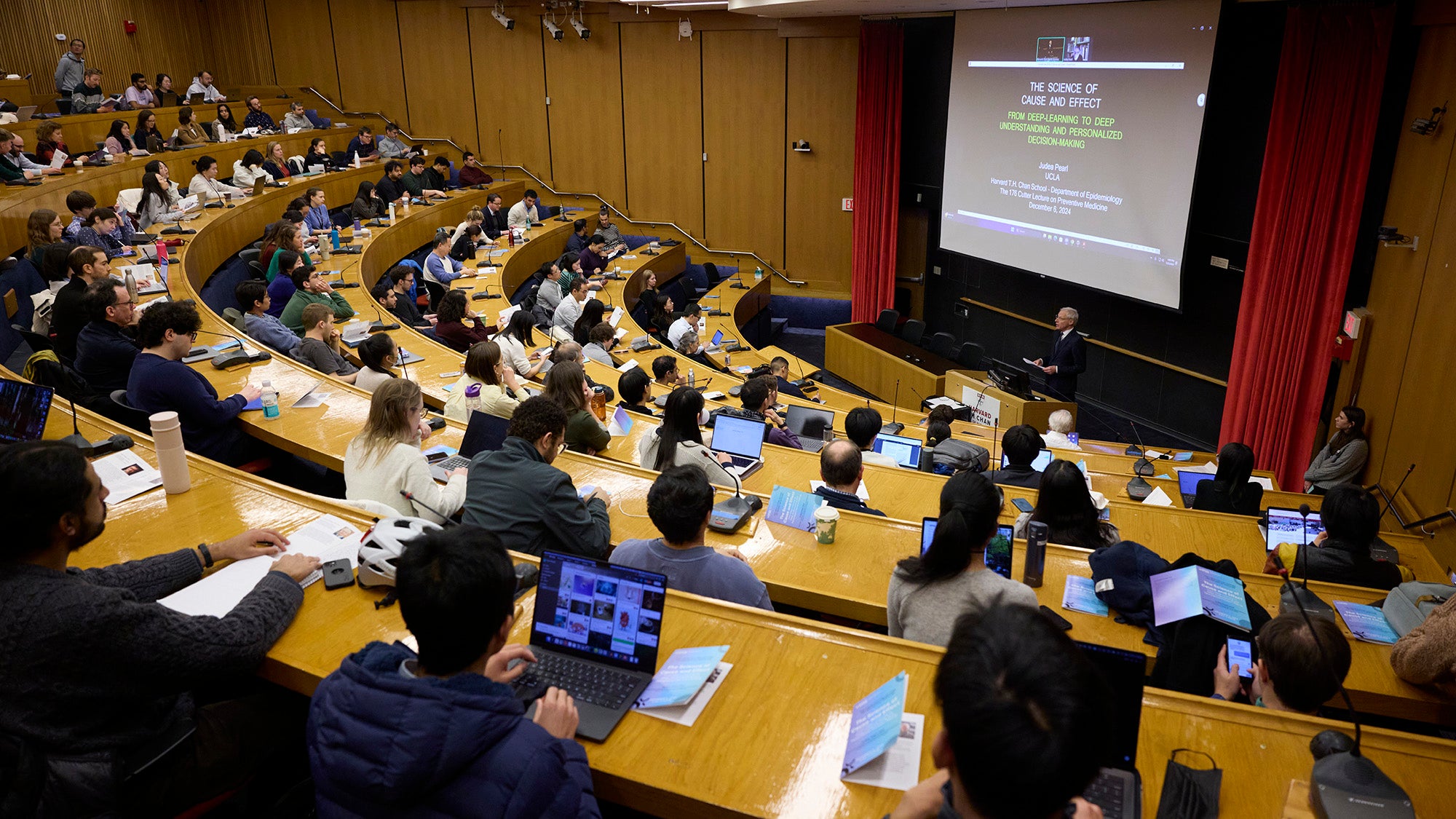Human Immunomics Initiative will decode immune system, speed new vaccines

Harvard Chan School-Human Vaccines Project collaboration will use artificial intelligence and causal inference to accelerate drug and vaccine development
For immediate release: April 14, 2020
Boston, MA–The Harvard T.H. Chan School of Public Health and the Human Vaccines Project announce the Human Immunomics Initiative, a joint project that aims to revolutionize the understanding of the human immune system and accelerate the creation of effective vaccines, diagnostics, and treatments. The Human Immunomics Initiative (HII) will bring together Harvard Chan School experts in epidemiology, causal inference, immunology, and computational and systems biology with the resources and expertise of the Human Vaccines Project, a global, nonprofit, human immunology-based clinical research consortium. HII will develop artificial intelligence-powered models of immunity that can be used to accelerate the design and testing of vaccines and therapeutics for a wide range of diseases.
Vaccine development has again entered the global spotlight as the world waits for a COVID-19 vaccine. Developing vaccines is a lengthy, arduous and expensive process. Many candidates fail during testing, often due to the complexity of the human immune system and its variability among different people and groups. Now, with advances in computing and artificial intelligence, genomics, systems biology, and bioinformatics, HII aims to decode the underlying mechanisms and rules of how the human immune system fights disease. HII will specifically focus on determining the principles of effective immunity in aging populations, the world’s largest growing demographic that has an immense disease burden and high morbidity and mortality in the current COVID-19 pandemic.
“Successful vaccination requires four components —knowing the vaccine target, what kind of immune response you want, how to generate that response, and understanding responses in the people who you want to vaccinate,” says Sarah Fortune, chair of Harvard Chan’s Department of Immunology and Infectious Diseases. “We understand a lot about the first two elements and very little about the last two. But by addressing these critical knowledge gaps, we envision a day when there are modular blueprints for successful vaccines that speed the process and increase likelihood of success.”
The insights gained through HII will pave the way for artificial intelligence-powered models that allow researchers to virtually test potential vaccines, and predict what vaccines and therapies might work best across populations. This could massively speed up vaccine and drug development, and lower costs spent on testing and trials.
“The way we fight disease is broken—we launch into disease-specific battles without understanding the rules that affect our chances of success,” says Michelle A. Williams, Dean of Harvard T.H. Chan School of Public Health. “The Human Vaccines Project set out to change that by decoding the human immunome, and we are already seeing initial findings from their tremendous work. We are excited to bring the intellectual and technological resources of Harvard Chan School, and our colleagues across Harvard, to further those efforts through HII.”
The Human Immunomics Initiative will combine new testing techniques with advanced biological and computational science to model immunity across populations. The pilot phase of the initiative will examine how immunity changes with age, and how to predict or improve immune responses among aging adults. “Decline or dysfunction of the immune system among people age 70 and older is a major public health issue as the global population ages. We are seeing this acutely now with COVID-19, which is mostly spread by younger people, but which older people die from at much higher rates,” notes Jaap Goudsmit, adjunct professor of epidemiology and infectious diseases at Harvard Chan School and chief scientific officer of the Human Vaccines Project.
“The world’s population is aging at unprecedented rates, significantly increasing the burden of non-communicable diseases and vulnerability to infectious diseases, as evidenced by the current COVID-19 pandemic. The complexity of the human immune system has confounded efforts to prevent and control diseases in aging populations, and this collaboration will marry expansive data collection through clinical research with new technologies and cutting-edge science to catalyze new approaches to fighting major global diseases,” says Wayne C. Koff, president and CEO of the Human Vaccines Project. “We are very excited to launch the Human Immunomics Initiative with the Harvard Chan School, and bring together our synergistic capabilities towards accelerating disease prevention for aging populations.”
HII will work with blood samples from thousands of people enrolled in epidemiological studies across the world. Human Vaccine Project members and Harvard Chan scientists have already done extensive work in various cohorts, and specific pilot studies are almost completed.Building on these longitudinal cohort studies, the Human Immunomics Initiative will apply state-of-the art methods in epidemiology, immune monitoring, systems biology, AI and machine learning to define effective immunity in aging populations, and apply these data towards accelerating vaccine and therapeutic development. The Human Vaccines Project’s global network of academic, biotech and pharma partners, coupled with Harvard’s linkages to the Cambridge-Boston R&D ecosystem and dedicated facilities for collaboration, will greatly enhance the potential for successful deciphering of effective immunity in aging populations, and enable development of novel strategies for enabling longer, healthier lives.
photo: Shutterstock
For more information:
Chris Sweeney
Harvard T.H. Chan School of Public Health
csweeney@hsph.harvard.edu
617.549.2638
Ted Schenkelberg
Human Vaccines Project
tschenkelberg@humanvaccinesproject.org
646.441.0894
About Harvard T.H. Chan School of Public Health
The Harvard T.H. Chan School of Public Health brings together dedicated experts from many disciplines to educate new generations of global health leaders and produce powerful ideas that improve the lives and health of people everywhere. As a community of leading scientists, educators, and students, we work together to take innovative ideas from the laboratory to people’s lives—not only making scientific breakthroughs, but also working to change individual behaviors, public policies, and health care practices. Each year, more than 400 faculty members at Harvard Chan School teach 1,000-plus full-time students from around the world and train thousands more through online and executive education courses. Founded in 1913 as the Harvard-MIT School of Health Officers, the School is recognized as America’s oldest professional training program in public health.
Learn more: https://www.hsph.harvard.edu
About the Human Vaccines Project
The Human Vaccines Project is a nonprofit public-private partnership with a mission to decode the human immune system and accelerate the development of vaccines and immunotherapies across major global diseases. The Project brings together leading academic research centers, industrial partners, nonprofits and governments to answer core questions about how the human immune system fights disease and pioneer a new era in human health.
Learn more: http://www.humanvaccinesproject.org
# # #

